Commercial sexual exploitation of children (CSEC) affects an estimated 1.8 million children globally. In Nepal, the adult entertainment sector (AES) is recognised as a high-risk environment for children where sexual exploitation is known to occur. The sector includes venues such as restaurants, folk dance bars, erotic dance bars, massage parlours, guest houses and hotels. Not all these venues are exploitative or engage children in sexual services. However, working in these venues can lead many girls and young women to a gradual or forced familiarisation with, and immersion in, the sex industry.
In 2016, the Freedom Fund partnered with the University of Hong Kong, Griffith University and Terre des hommes Foundation in Nepal to conduct research on services that support girls and young women in Kathmandu to exit situations of commercial sexual exploitation in the AES. The specific aim of the study was to identify what services and systems are needed for girls to speedily, safely and permanently leave the AES.
This Evidence in Practice report offers recommendations for policy makers, service providers and funders working to end the commercial sexual exploitation of children. The report was prepared by the Freedom Fund, based on a longer research paper led by Dr Lucy Jordon at the University of Hong Kong.

